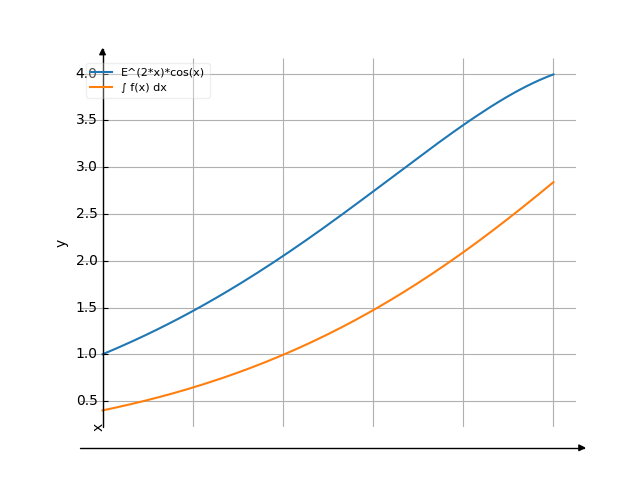Integral of e^(2x)cosx dx
The solution
You have entered
[src]
1 / | | 2*x | e *cos(x) dx | / 0
$$\int\limits_{0}^{1} e^{2 x} \cos{\left(x \right)}\, dx$$
Integral(E^(2*x)*cos(x), (x, 0, 1))
Detail solution
-
Use integration by parts, noting that the integrand eventually repeats itself.
-
For the integrand :
Let and let .
Then .
-
For the integrand :
Let and let .
Then .
-
Notice that the integrand has repeated itself, so move it to one side:
Therefore,
-
-
Now simplify:
-
Add the constant of integration:
The answer is:
The answer (Indefinite)
[src]
/ | 2*x 2*x | 2*x e *sin(x) 2*cos(x)*e | e *cos(x) dx = C + ----------- + ------------- | 5 5 /
$${{e^{2\,x}\,\left(\sin x+2\,\cos x\right)}\over{5}}$$
The graph
The answer
[src]
2 2 2 e *sin(1) 2*cos(1)*e - - + --------- + ----------- 5 5 5
$${{e^2\,\sin 1+2\,e^2\,\cos 1}\over{5}}-{{2}\over{5}}$$
=
=
2 2 2 e *sin(1) 2*cos(1)*e - - + --------- + ----------- 5 5 5
$$- \frac{2}{5} + \frac{e^{2} \sin{\left(1 \right)}}{5} + \frac{2 e^{2} \cos{\left(1 \right)}}{5}$$
The graph

Use the examples entering the upper and lower limits of integration.

![Find the integral of y = f(x) = e^(2x)cosx dx (e to the power of (2x) co sinus of e of x) - with detailed solution [THERE'S THE ANSWER!] e^(2x)cosx](/media/krcore-image-pods/176/hash/indefinite/2/c6/7aeb5144bbdf3ae0fa81028fc797e.png)
 Integral of 2*x^2
Integral of 2*x^2
 Integral of e^(2*x)*cos(x)
Integral of e^(2*x)*cos(x)